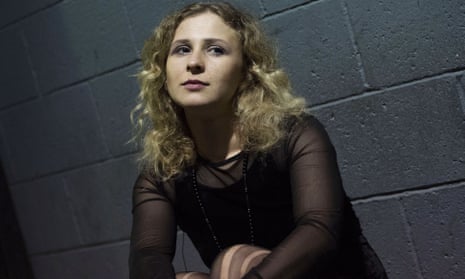A member of the protest band Pussy Riot has smuggled herself out of Russia after being barred by the government from travelling to perform at the Edinburgh festival fringe.
Maria Alyokhina, one of three members of Pussy Riot who stood trial in 2012 for a “punk prayer” at a Moscow church, was stopped by Russian border guards and told she could not leave the country. The reason given was that she had refused to serve a community service sentence for a separate protest held against Russia’s powerful Federal Security Service.
Following the ban, Alyokhina drove more than 1,000 km through Belarus, where border security is not so tight, and then into Lithuania in the European Union, where she boarded a flight for the UK.
“It was nothing extraordinary,” she told the Guardian on Thursday. “It was like many Russians leave [the country], legally.”
Alyokhina was travelling to Edinburgh to promote her book Riot Days, which has been billed as a mix of “punk, electronica, theatre, documentary footage and protest”.
“Pussy Riot founder Maria refused to be captive and silenced,” the group said in a statement announcing the escape. “She was absolutely determined to perform the show and will be there in person to join her band mates to share her story.”
Alyokhina was jailed for nearly two years in Russia over a punk protest in 2012 at the Christ the Saviour Church in central Moscow. The trial became an international cause celebre and led to calls from foreign musicians for Alyokhina and another bandmate, Nadezhda Tolokonnikova, to be released. They were both given amnesty in 2013, near the end of their sentences.
Since her release, Alyokhina has become one of the country’s most recognised advocates for prisoners’ rights. She has donated much of the money from her public appearances at events such as Glastonbury to organisations she helped set up, including the Zona Prava NGO and the media site Mediazona, which writes mainly about criminal trials and the penitentiary system in Russia.
Earlier this week, Alyokhina and two other activists staged a protest outside the headquarters of Russia’s federal penitentiary service in Moscow over the torture of inmates in Russian prison colonies.
The group hung a stark red-and-black banner saying that the penitentiary service was equivalent to the gulag, the Soviet-era prison system that imprisoned tens of millions. They also hung pictures showing injuries sustained by people in Russian prison colonies.









